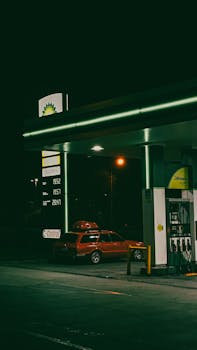
**
The UK's fuel retail landscape is buzzing with speculation as Motor Fuel Group (MFG), the country's largest independent forecourt operator, emerges as a potential suitor for BP's $8 billion Castrol lubricants business. This high-stakes acquisition battle, involving global giants and significant financial investment, promises to reshape the automotive lubricants market and fuel retail sector. The potential sale of Castrol, a brand synonymous with engine oil and automotive care, has attracted considerable interest from diverse players, highlighting the strategic importance of the asset.
BP's Castrol Divestiture: A Strategic Shift
BP's decision to divest its Castrol business marks a significant strategic shift for the energy giant. As the world transitions toward cleaner energy sources, BP is focusing its resources on renewable energy and low-carbon technologies. This strategic realignment necessitates streamlining its portfolio and focusing investments where its long-term growth prospects are strongest. The expected proceeds from the Castrol sale will likely fuel investments in BP's core renewable energy and low-carbon projects, reinforcing its commitment to a sustainable future.
Castrol's Market Position and Value
Castrol, a global leader in the automotive lubricants market, holds a considerable market share with its extensive product portfolio targeting diverse customer segments, ranging from passenger cars to heavy-duty vehicles. Its strong brand recognition and established distribution network across global markets contribute significantly to its estimated $8 billion valuation. The brand's value extends beyond mere financial figures; it encompasses customer loyalty, technological expertise, and a well-respected global presence.
MFG's Bold Bid: Expanding Beyond Fuel Retail
MFG's entry into the bidding war for Castrol is a bold move that signals its ambitious expansion plans beyond its core fuel retail business. While predominantly known for its extensive network of petrol stations across the UK, MFG recognizes the synergistic potential of integrating Castrol's lubricant offerings into its existing infrastructure. This strategy could significantly enhance MFG's revenue streams and customer offerings, transforming it into a more integrated player in the automotive sector.
Strategic Synergies and Growth Opportunities
The acquisition of Castrol could present several key strategic synergies for MFG:
- Expanded Product Portfolio: Integrating Castrol's lubricants would significantly expand MFG's product portfolio, offering customers a wider range of automotive products at its forecourt locations.
- Enhanced Customer Loyalty: Offering high-quality Castrol lubricants alongside fuel could enhance customer loyalty and drive repeat business.
- Increased Revenue Streams: The sale of Castrol products would generate significant additional revenue streams for MFG, contributing to overall financial growth.
- Strengthened Market Position: Acquiring Castrol would significantly strengthen MFG's market position, transforming it into a major player in both the fuel retail and automotive lubricants sectors.
- Diversification of Revenue: The acquisition would diversify MFG's revenue sources, reducing dependence on fluctuating fuel prices and providing greater resilience against market volatility.
The Competition: Global Players Vie for Castrol
The bidding for Castrol is anticipated to be fiercely competitive, with several global players reportedly expressing strong interest. Private equity firms, along with other major players in the automotive and chemicals industries, are expected to participate in this high-stakes acquisition. The high valuation of Castrol reflects its strong brand equity, global reach, and robust growth potential. The final outcome will depend on several factors, including financial capabilities, strategic synergies, and regulatory approvals.
Potential Challenges and Considerations for MFG
While the acquisition presents significant opportunities for MFG, several challenges need to be considered:
- Financing the Acquisition: Securing the necessary financing to fund an $8 billion acquisition will be a major hurdle for MFG.
- Integration Challenges: Integrating Castrol's operations and supply chains into MFG's existing infrastructure will require significant planning and execution.
- Regulatory Approvals: Securing the necessary regulatory approvals from competition authorities will be crucial for the deal's success.
- Competition: Facing off against global giants with substantially greater resources poses a significant challenge for MFG.
The Future of MFG and the Automotive Lubricants Market
The outcome of the Castrol acquisition will have significant implications for both MFG and the broader automotive lubricants market. If successful, MFG's acquisition would dramatically alter its trajectory, transforming it from a predominantly fuel retail business into a more diversified automotive player. The deal could also reshape the competitive landscape of the lubricants market, leading to increased consolidation and strategic realignment among major industry players. The future certainly looks exciting, albeit uncertain, for all involved. The coming months will be crucial in determining the next chapter in this compelling industry narrative, with significant implications for the future of both MFG and the wider automotive sector. Watch this space for further updates as the bidding process unfolds.




















